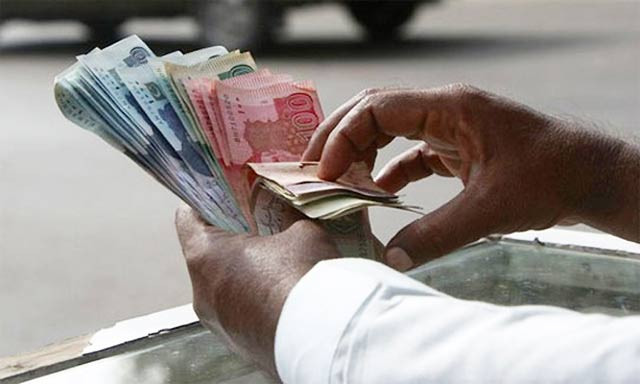ECC rolls over bank loans as circular debt crosses Rs800b
Also exempts Matiari-Lahore power transmission line from various taxes

PHOTO: REUTERS
The Economic Coordination Committee (ECC) of the cabinet approved five separate summaries in an effort to extend repayment period of the principal amount of Rs193 billion by another two to three years.
It gave blanket tax exemptions to the $2.1-billion Matiari-Lahore transmission line project of the China-Pakistan Economic Corridor (CPEC), though the government was in dire need of finances to meet its expenses.
The Rs193-billion debt rollover includes a three-year extension in the repayment period of Rs82 billion, raised through sale of term finance certificates (TFCs) to Oil and Gas Development Company (OGDC) against liabilities.
The OGDC loan resettlement had been reached at an interest rate equal to Karachi Interbank Offered Rate (Kibor) plus 1% and other loans at Kibor plus 2%.
Of the Rs193 billion, Rs97 billion was borrowed by the Pakistan Peoples Party (PPP) government and the remaining was obtained by the PML-N administration from banks to pay off liabilities of independent power producers (IPPs).
“The total circular debt of the power sector has crossed Rs800 billion for the first time in Pakistan’s history,” remarked an official of the Ministry of Water and Power.
The amount included Rs425 billion parked in Power Holding (Private) Limited (PHPL) and another Rs375 billion, he added.
Of the Rs425 billion parked in the holding company, Rs193 billion had to be partially serviced last year, he added. Out of the Rs193 billion, Rs111 billion had been borrowed on four different occasions by power distribution companies with sovereign guarantees from the Ministry of Finance.
The ECC approved the issuance of sovereign guarantees in respect of Rs111 billion, according to a statement of the Ministry of Finance. This shows that the loan facility has been extended by two more years, apparently because of the federal government’s inability to service the debt. “In all four cases, the payment of principal installment shall be deferred for a further period of two years from the date of execution of fresh facilities,” said the finance ministry.
Pakistan had assured the International Monetary Fund that it would settle the debt parked in PHPL by privatising power distribution companies. However, it could not meet its commitment.
The federal government also failed to meet borrowing conditions of the Rs82-billion debt that the PPP government took from OGDC in September 2012 by floating seven-year TFCs.
The first principal installment of Rs10.2 billion was due in March 2016, but the government could not return the loan. The ECC on Tuesday approved an extension of three years in the repayment period to March 10, 2019 including the grace period.
The government’s inability to repay the maturing debt highlights the worsening financial condition of the power sector. Documents of the Ministry of Water and Power showed that during July-December 2016, recoveries of the power distribution companies fell significantly.
CPEC tax exemptions
The ECC approved blanket tax exemptions for the $2.1-billion 660-kilovolt high-voltage direct current (HVDC) Matiari-Lahore transmission line that was being laid by China Electric Power Equipment and Technology Company under CPEC.
Private Power and Infrastructure Board (PPIB) had approved the implementation agreement and transmission services agreement for the project, which it submitted for seeking tax exemptions.
The ECC reduced the standard 17% sales tax on the import of goods to 5%. Similarly, customs duty was slashed to 5%. Tax exemptions have been given even on the goods produced locally and will have adverse implications for the local industries.
The ECC also exempted profits and gains derived by a domestic company from the transmission line project from the standard corporate income tax for 10 years. The project was exempted from 1.25% minimum income tax and 17% alternate corporate income tax for 10 years.
Withholding taxes on the import of plant and machinery and specialised vehicles were also exempted for 10 years.
Pakistan has already provided tax exemptions worth $1.5 billion to various CPEC projects. This has affected FBR’s revenues besides putting local industries at a disadvantage.
Published in The Express Tribune, July 26th, 2017.
Like Business on Facebook, follow @TribuneBiz on Twitter to stay informed and join in the conversation.


















COMMENTS
Comments are moderated and generally will be posted if they are on-topic and not abusive.
For more information, please see our Comments FAQ